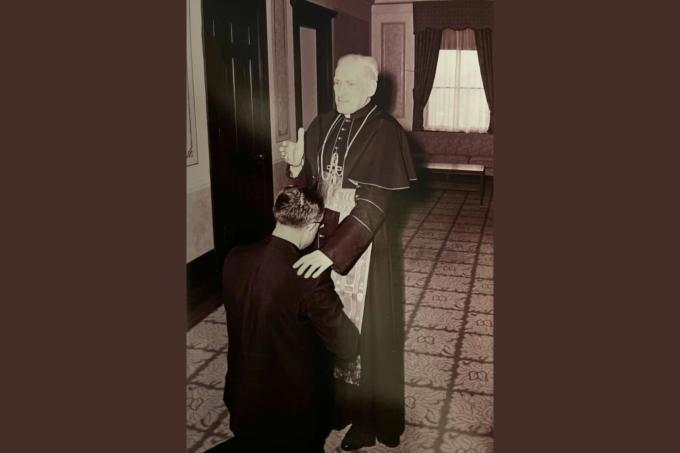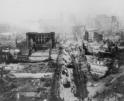
Culture
As the first non-Irish or Irish-American to serve as bishop, save the founding prelate Jean Cheverus, Medeiros's appointment placed him in an apologetic position from the outset.
Shock, surprise, and a generally tepid welcome characterized the arrival of Humberto Medeiros when he took the reins as the fourth Archbishop of Boston on Oct. 7, 1970. Despite his excellent record in Brownsville and the fact that Critic magazine named him one of the 12 bishops with the most promise for their future in the American Church, Medeiros' appointment was a surprise to most and, unfortunately, not welcomed by some. As the first non-Irish or Irish-American to serve as bishop, save the founding prelate Jean Cheverus, Medeiros's appointment placed him in an apologetic position from the outset. While the rationale for his appointment can only be speculated, there is no doubt that, from the outset, he vigorously engaged in his new work, following the iconic Cardinal Richard Cushing.
Medeiros made his mark on the archdiocese from the outset of his tenure. In February 1972, after significant research and consultation, Medeiros announced a major re-organization of the archdiocese. He erected three geographic regions (later a fourth was added), each supervised by an auxiliary bishop. Within each region were at least two vicariates, each supervised by a priest. One of his most significant achievements as archbishop was liquidation of a massive $45 million debt that he inherited from Cardinal Cushing. Medeiros skillfully navigated the archdiocese through these treacherous fiscal waters by mandating some budget cuts, the sale of a few parcels of land, but primarily by his inauguration in April 1971 of the Archdiocesan Stewardship Appeal. The faithful responded generously as, over the remaining years of his tenure, the annual appeal netted on the average of $5.5 million. His efforts in support of the archdiocese were noted by Pope St. Paul VI when he was elevated to the College of Cardinals on March 5, 1973.
In Boston, as he had done in both Fall River and Brownsville, Medeiros fully supported implementation of the dictates of Vatican II. In 1972, he authorized the creation of a permanent diaconate program; the first deacons were ordained in May 1976. He also established rules for extraordinary ministers of the Eucharist, commissioning 800 men and women to this ministry on Sept. 23, 1973. Additionally, he formalized the priest senate (today the presbyteral council), attending most meetings and listening closely to and generally heeding the advice of his priests. Medeiros was a strong advocate of ecumenism and interfaith dialogue, leading to a common statement issued with the Episcopal Bishop of Massachusetts, and forging a cordial relationship with the local Jewish community.
Although the debt in many ways colored Medeiros's years as archbishop and, therefore, restricted his ability to inaugurate new plans and programs, he skillfully, yet selectively, put into action programs for the poor. Medeiros's major initiative in this quest was his promotion of low-income housing in the archdiocese. He was forced to utilize a new anti-snob zoning law when citizens in various locales fought the construction of these units. Eventually, he was able to engineer the construction of low-income housing units in Lexington, Andover, and Beverly. Medeiros was a strong advocate for prison reform, especially the inauguration of a furlough program for serious offenders. In a similar vein, he inaugurated the Covenant of Justice, Equity, and Harmony, seeking to bring greater harmony and racial justice to Boston after the murder of an African American teenager, Darryl Williams, in September 1979.
Humberto Medeiros strongly upheld Church teaching. No issue illustrates this more profoundly than his absolute stance against abortion. Medeiros constantly and stridently argued that abortion was immoral and needed to be rooted out of human practice. The Roe v. Wade Supreme Court decision of January 1973 was a dark day for Medeiros. He commented on the decision, "I am struck with horror and dismay by this crude decision. At a time when so much importance is rightly given to human values without distinction of race, creed, or class, a death blow is now being dealt against the sacred origins of every person." Additionally, in March 1974, Medeiros, together with Cardinals John Krol of Philadelphia, John Cody of Chicago, and Timothy Manning of Los Angeles, testified before a Senate sub-committee in support of a constitutional amendment that stated that an unborn child is a person.
Cardinal Medeiros's tenure in Boston, while marked with much success, also found some significant conflicts. His battle with fellow Catholics over Judge Arthur Garrity's 1974 mandatory busing decision wounded him deeply. Political fights with Sen. Edward Kennedy and (at the time) congressional candidate Barney Frank over abortion created significant divisions. His low-income housing success north of Boston was not duplicated in Scituate, where Medeiros lost a long-protracted battle with the faithful at St. Mary of the Nativity Parish.
Cardinal Medeiros died rather unexpectedly on Sept. 17, 1983, after what was thought to be successful heart surgery. The outpouring by the faithful during his wake, funeral, and most especially motorcade south to his burial in the family plot in Fall River, demonstrated that, despite a tepid welcome and some significant battles, Humberto Medeiros had endeared himself in the hearts of Boston Catholics.
FATHER RICHARD E. GRIBBLE, CSC, IS A MEMBER OF THE FACULTY OF STONEHILL COLLEGE IN NORTH EASTON, AND AUTHOR OF A FORTHCOMING BIOGRAPHY OF CARDINAL MEDEIROS.
Recent articles in the Culture & Events section
-
Boston and the nation respond to the San Francisco Earthquake of 1906Thomas Lester
-
See you in the storyLaura Kelly Fanucci
-
'Dignitas' and the mediaRussell Shaw
-
Scripture Reflection for April 14, 2024, Third Sunday of EasterDeacon Greg Kandra
-
St. Helena's House is established in the South EndThomas Lester


















